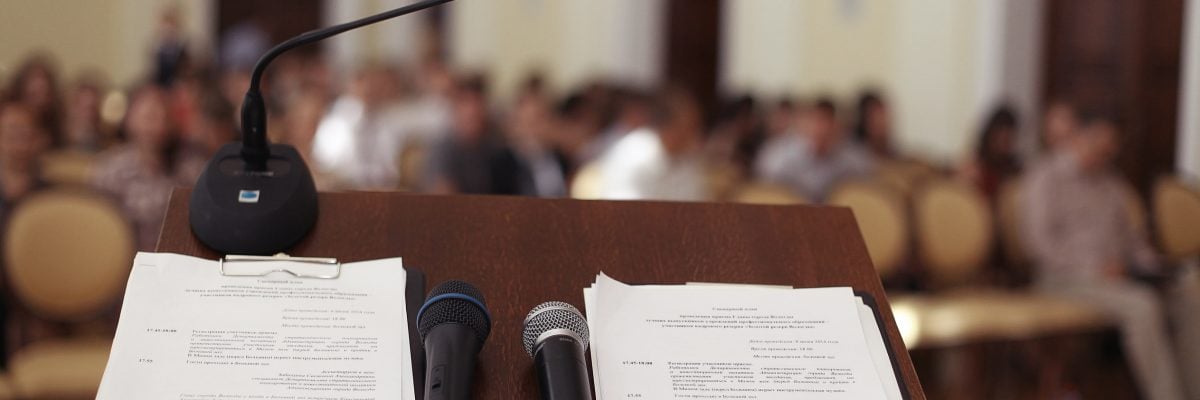
Recently, a college student asked me if I would come to her campus and engage in a public debate on the issue of abortion. I said I would be happy to. Not only are debates one of my favorite things to do as an apologist, I believe they are among the best ways to evangelize university campuses.
Unfortunately, the sponsor of her Catholic club was completely opposed to the idea. He said he considered debates divisive; also, there was the possibility that my opponent might convince one of his students to become pro-choice!
I have heard people say we shouldn’t debate Church’s teachings because that would amount to a concession they could be wrong. Instead, we should boldly proclaim those teachings and the truth will “defend itself.”
An example of this attitude can be seen in Italian archbishop and president of the Pontifical Academy for Life, Vincenzo Paglia, who once told a reporter, “I am so certain of the power of Christian values that I don’t feel a need to defend them, they defend themselves.” (For more thoughts on this incident, see my colleague Todd Aglialoro’s post.)
In my view, though, all of these objections are misplaced. Throughout Church history, the faithful have found it both necessary and effective to use public debates in order to spread the gospel. Let’s take the objections one by one.
“The truth should be proclaimed, not debated”
It’s true that the first Christians proclaimed the gospel, but they also publicly disputed those who rejected it.
The Church’s first deacon, St. Stephen, debated people in the synagogue so fiercely that his opponents “could not withstand the wisdom and the Spirit with which he spoke” (Acts 6:10). A believer named Apollos also “powerfully confuted the Jews in public, showing by the scriptures that the Christ was Jesus” (Acts 18:28). St. Paul spent every day in Athens arguing in the marketplace (Acts 17:17), and in Ephesus he “argued daily in the hall of Tyran’nus. This continued for two years, so that all the residents of Asia heard the word of the Lord, both Jews and Greeks” (Acts 19:9-10).
But is it true that Christian truths do not “need” us to defend them? Well, in the early Church, the truth about grace had to be defended against the Pelagians, the truth about Christ’s divinity had to be defended against the Arians, and the truth about the value of human life had to be defended against the barbarians. In the modern world, the truth about faith has to be defended against atheists, the truth about the Church has to be defended against Protestants, and the truth about the value of unborn children has to be defended against advocates of abortion.
Finally, some people like to quote St. Augustine as saying, “The truth is like a lion, you don’t have to defend it. Let it loose and it will defend itself.” However, as I show in my book What the Saints Never Said, this is definitely a fake quote. Augustine never said it. In fact, he even wrote in the City of God that refuting heretics can be an ideal way to evangelize others, because “the necessity of defending [the articles of faith] forces us to investigate them more accurately, to understand them more clearly, and to proclaim them more earnestly; and the question mooted by an adversary becomes the occasion of instruction.”
“Debates are divisive and ineffective”
Not long ago, a Christian college called Grand Canyon University canceled a planned speaking event with conservative pundit Ben Shapiro out of fear that his speech would be too divisive. Later it reversed this decision, but initially the school said, “We believe in many of the things that Ben Shapiro speaks about and stands for.” Yet it defended the cancellation as a means to “bring unity to a community that sits amidst a country that is extremely divided and can’t seem to find a path forward toward unity.”
One answer to this charge of divisiveness is to point out that, as Christians, our goal is not that everyone should believe the same thing but that everyone should believe the truth. And the truth always divides people into those who accept it and those who reject it.
Jesus himself said, “Do you think that I have come to give peace on earth? No, I tell you, but rather division” (Luke 12:51). Jesus went on to describe how this division would occur when his disciples’ friends and even their own family members would reject them.
So, given that the truth already divides people, I have found debates to be one of the best ways to bring together those who disagree.
For example, when I am invited to give a talk on a non-controversial subject, sometimes there may be only about fifty people who attend and barely a handful, if any, who are non-Catholic. But when I debate atheism or abortion on campus, hundreds of students show up, and a significant portion of them are on “the other side” of the issue being debated. At my recent debate with Dan Barker, dozens of students had to be turned away from an auditorium that sat 400. Debates become a place where all kinds of people gather in order to experience a respectful “clash of ideas” and, it can be hoped, be drawn toward the truth.
“Debates don’t change anyone’s minds”
I agree that it isn’t prudent to have someone unskilled at debating publicly take on a critic of Church teaching. But when there is a reasonable prospect that the truth will be well-defended, a debate can be an opportunity for the Holy Spirit to move someone’s heart and mind to know the truth. That’s why I vehemently disagree with the idea that debates “don’t change anyone’s minds.”
True, not everyone who hears the Faith well-defended is instantly converted, but then, no evangelization method has a 100 percent success rate. And like many of our evangelization efforts, the benefits can be cumulative and the fruits evident only well into the future.
Debates have been instrumental to many people’s conversions, including my own. This is one reason why I agree to do them only if they can be shared online so that their positive effects can reach a much greater number of people. A few years ago, I received an email from a woman who saw the video of students at Brock University heckling me during a pro-life presentation. Her testimony illustrates why I am thankful God has blessed me with the opportunity to defend the teachings of the Church in public debates, and provides a perfect final rebuttal of the idea that debate can’t change hearts and minds:
I watched the clip of your encounter with the students Brock University this week. I was saddened by how they treated you but the more uncomfortable thing for me was that I recognized myself in their behavior. That could have been me twenty years ago, back when I was an undergraduate at university. Seeing this video was what compelled me to write you. I wanted to let you know that sometimes people do change.
One day last fall I was listening to Catholic Answers Live, and you were the guest. The subject was “Why are you pro-choice?” I started listening, and a crazy thing happened. Everything you said made sense. It was logical. And no one who called in seemed to be able to formulate a clear and solid argument for why abortion was okay. I thought, “Well, none of these people are experts on the reasons for why pro-choice is the right decision. Of course they aren’t making sound arguments!”
You then mentioned the debate you’d had with Cecili Chadwick, which was posted on YouTube. So I checked it out, and once again I was struck by how flimsy the pro-choice argument seemed. It was innately flawed. I felt so frustrated with everyone you debated because none of them could formulate a concise argument for why they believed what they did.
And that’s how you turned a staunch pro-choice believer into someone who is now pro-life: by logic.



